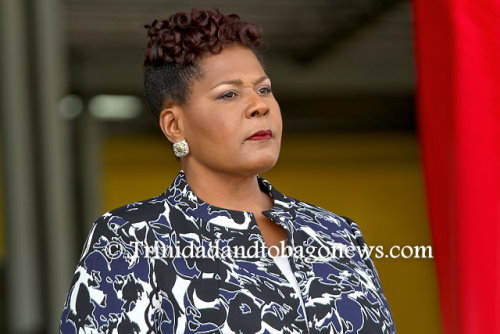Our Humble First Servant
By Dr Selwyn R. Cudjoe
March 27, 2018

President Paula-Mae Weekes, the sixth president of the Republic of T&T
"A true and worthy ideal frees and uplifts a people; a false ideal imprisons and lowers [them]." — W. E. B. Du Bois, "The Souls of White Folks"
I am beyond myself with pride that the present government selected Paula-Mae Weekes to be the first president of the Republic of Trinidad and Tobago (TT). It speaks volumes about our confidence in ourselves and points the way forward. This appointment speaks volumes particularly when women are being targeted, demeaned, and killed with growing frequency.
Her first address to her fellow citizens was uplifting. She used the correct tone, uttered the right sentiments, and created amity among our citizens. Her address had the marking of a transactional leader. She performed the role of guide, motivator, and inspirer with aplomb. Her presentation reestablishes the esprit de corps of a nation that needs to feel a sense of common purpose.
President Weekes depicted herself as our "'humble first servant' with a mandate to render service with enthusiasm." Her training taught her that she who wishes to lead must first learn to follow. Christ washed the feet of his disciples. Matthew admonished: "He who wants to become great among you must be your servant."
Her address was one of moral and spiritual uplift. She chastised those who only see doom and gloom in the society and insisted we "mobilize forces and resources to step out boldly and make TT a better place for us and our children all the while understanding that though faith is a necessity, without action it is useless."
I would add that action without an informed understanding of the cause of the problem could be equally as blind. While I welcomed the imagery of light that cascaded through her address and her imploring us "to soldier on" one must always know toward what end one is acting. Such knowledge enables one to see the light at the end of the tunnel. Socrates admonished: "awareness of one's ignorance is far better than the illusion of knowledge."
Nonetheless, I appreciate her maxim: "A flickering candle can be as effective as a blazing bushfire in the right environment." One is more likely to remember these homemade images rather than extravagant phrases.
It matters that President Weekes is a black woman, an Anglican, and a hard worker. As I thought of her achievement I remembered my mother, a staunch Anglican, and her insistence that we assist our brothers and sisters even as we praise our God. Her mantra was: "God only help those who help themselves." Although this inspirational sentence is not in the Bible (Isaiah 25:4 suggests the opposite), it helped my mother to trod on when things were not as bright as they might have been.
But struggle on she did. She worked in a white woman's kitchen, ran her sou-sou, planted her garden, sewed her dresses, and made the best of her life. She was a member of the St. Mary's Anglican Church, the Mother's Union, the Garden Club, and secretary of the Tacarigua Welfare and Improvement Council. I still have the book in which she kept the minutes of that organization. She praised her God even as she served her people.
President Weekes attended an Anglican School. Prior to becoming the president of this great nation, she was the chancellor of the Anglican Church of TT. She is an active church member. Like my mother, and my paternal grandmother, President Weekes was one of the thousands of mothers who kept the Church going over the years—be it the Anglican or the Spiritual Baptist churches.
President Weekes grew up in or was imbibed with a deep religious tradition (African and English Catholic) that taught her to understand, "'Tis grace hath brought me safe thus far,/ And grace will lead me home" ("Amazing Grace"). Some of my detractors will want to remind me that the author of those words was a slave trader (he later gave his life to Christ). He became an Anglican and wrote one of the most stirring hymns in the English-speaking world.
But it is to W. E. B. Du Bois we must turn to get a sense of the power of these black women who served their church and their state. He says: "No other women on earth could have emerged from the hell of force and temptation which once engulfed and still surrounds black women in America [and the West Indies] with half the modesty and womanliness that they retain. I have always felt like bowing before them in all abasement, searching to bring some tribute to these long-suffering victims, these burdened sisters of mine, whom the world, the wise, white world loves to affront and ridicule and wantonly to insult. I have known the women of many lands and nations,—I have known and seen and lived beside them, but none have I known more sweetly feminine, more unswervingly loyal, more desperately earnest, and more instinctively pure in body and in soul than the daughters of my black mothers" ("Damnation of Women").
Wherever my mother was on Monday she would have rejoiced in seeing President Paula-Mae Weekes take her place as the first among equals in our land. She represents the best in all of us.
Professor Cudjoe's email address is scudjoe@wellesley.edu. He can be reached @ProfessorCudjoe.
Share your views here...
|

